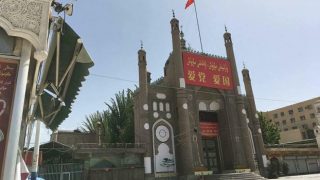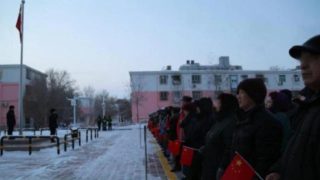
Malaysia has appointed an international institute at a local university to prepare a study examining reports about alleged rights abuses committed by Beijing against Uyghur Muslims in China’s Xinjiang region, Foreign Minister Saifuddin Abdullah said Monday.
The government has selected the International Institute of Islamic Thought and Civilization (ISTAC) in Kuala Lumpur to study and verify the news reports on the alleged repression of the Uyghur community in Xinjiang, China, the state-run Bernama news service reported, citing Saifuddin.
A foreign ministry official who sought anonymity because he was not authorized to speak to the media told BenarNews, an RFA-affiliated online news service, that the minister made the statement during a public event in Pahang, east of Kuala Lumpur.
“Malaysia will neither blindly support any reports provided by the Chinese government nor openly criticize China,” the English daily New Straits Times quoted Saifuddin as telling reporters. “We want to ensure the truth behind each and every report that we receive about the incidents there.”
ISTAC is housed at the International Islamic University Malaysia (IIUM), a campus established in the 1980s in Selangor state with the goal of becoming a leading international research center in the field of Islamic thought, culture and civilization, according to the university’s website. Malaysia, along with several other Muslim-majority countries, including Saudi Arabia, Egypt, Turkey, Bangladesh and Pakistan, were co-sponsors of the university when it was founded.
Saifuddin also recalled that during his meeting with Chinese Foreign Minister Wang Yi on Sept. 12, he promised that Malaysia “will adopt a civilized approach” about the controversy around the plight of the Uyghurs, which includes reports that Beijing began locking up 1.8 million Uyghurs and other Muslims at internment camps in Xinjiang.
“We need to verify this, including the Uyghur separatist movements at the Xinjiang province and whether there were elements of terrorism in the issue,” the minister said, according to the New Straits Times.
China began incarcerating Uyghurs in a vast network of internment camps in April 2017 over accusations that members of the minority Muslim group harbored “strong religious views” and “politically incorrect” ideas.
Saifuddin’s comments came after China’s ambassador, Bai Tian, denounced pro-Uyghur protests that took place outside the Chinese Embassy in Kuala Lumpur on Tuesday and Friday. Hundreds of demonstrators waved banners and signs urging China to “stop genocide of ethnic Uyghurs.”
“We will never accept irresponsible, utterly groundless accusations based on falsehoods,” the Chinese envoy said Sunday.
He made the statement days after Prime Minister Mahathir Mohamad appeared to have taken a tougher stance, as he vowed not to extradite Uyghurs who seek refuge in his country.
Although Beijing initially denied the existence of internment camps, China has tried to change the discussion, describing the facilities as “boarding schools” that provide vocational training for Uyghurs, discourage radicalization and help protect the country from terrorism.
“If Uyghurs are fleeing to Malaysia to seek asylum, Malaysia will not extradite them even if there is an application from China,” Mahathir said. “They are allowed to go to the third country because they have valid fears over their safety.”
Reported by BenarNews, an RFA-affiliated online news service.
Source: Copyright © 1998-2016, RFA. Used with the permission of Radio Free Asia, 2025 M St. NW, Suite 300, Washington DC 20036. https://www.rfa.org.



